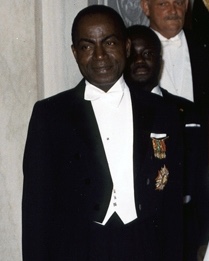“West African Wager” is a book published in 1972. It
deals with the post-independence developments in two West African nations,
Ghana and the Ivory Coast (Côte d'Ivoire). In 1957, the Ivorian leader Félix
Houphouët-Boigny made a symbolic wager with Ghanaian ditto Kwame Nkrumah,
claiming that the Ivory Coast would have better economic and social conditions
than Ghana within ten years. At the time, the Ivory Coast was still a French
colony, while Ghana (formerly the Gold Coast) had just achieved independence from
Britain. The wager was repeated by Houphouët at several points after the Ivory
Coast, too, became independent and was apparently well known in the region.
The author of “West African Wager”, Jon Woronoff, clearly sympathizes with Houphouët, who followed a moderate, pro-Western line, turning the Ivory Coast into a French-style capitalist mixed economy. The author believes that this, while hardly “solving” all of the nation's problems, nevertheless laid the basis for political stability and economic growth.
By contrast, Nkrumah tried to make Ghana “socialist” at break-neck speed, wrecking the economy in the process. In the name of Pan-African unity, Nkrumah attempted to destabilize other African nations, including the Ivory Coast. Nkrumah also promoted a personality cult around himself as “The African Personality” and the “Osagyefo” (often translated Redeemer) and even launched his own “philosophy”, known as Consciencism. In 1966, while Nkrumah was away on an official visit to China, the Ghanaian army staged a coup d'etat and declared the Redeemer overthrown. After a failed attempt to retake power with the aid of Guinea (another socialist-oriented nation in West Africa), Nkrumah resigned himself to his fate. He died in 1972.
At some points, Ghana and the Ivory Coast resembled each other. Both were one party states, and both leaders were de facto (Nkrumah even de jure) presidents for life. The uncritical attitude of the author towards Houphouët-Boigny leads him to downplay the Ivorian leader's participation in various destabilization attempts throughout the region, as if Nkrumah was the only culprit…
That being said, I nevertheless found “West African Wager” both interesting and slightly disturbing. Being left-of-center, my instinctive sympathies would be with Nkrumah, yet, it seems that his attempted leap towards socialism ended in the same way as the Soviet experiment: personality cult, fanatical youth brigades, soaring inflation, stagnant economy, complete failure in agriculture, and a dependency on foreign aid (often from the Eastern bloc) to make up for the deficits. The attempts by the great leader to construct his own “philosophy” are perhaps more unique (most socialist-oriented states simply adopt Marxism). However, it was also interesting to note that the “liberal” course (the author's words) in the Ivory Coast was really a form of dirigiste mixed economy, a far cry from neo-liberalism proper.
Judging by the list of references at the back of the book, there are more detailed and voluminous books on both nations, all of them out of print, but “West African Wager” seems to be a good summary as any, and I will therefore give it four stars.

No comments:
Post a Comment